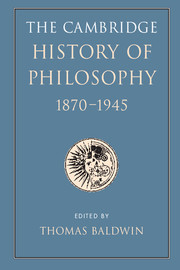Book contents
- Frontmatter
- Contents
- List of contributors
- Introduction
- I 1870–1914
- 1 Positivism, Idealism, and Pragmatism
- 2 Psychology and Philosophy
- 3 Logic, mathematics, and judgement
- 4 Philosophy and the new physics
- 5 The idea of social science
- 6 Ethics, politics, and legal theory
- 18 Utilitarians and idealists
- 19 Nietzsche
- 20 The new realism in ethics
- 21 Individualism vs. collectivism
- 22 Marxism and anarchism
- 23 Legal theory
- 7 Philosophy of religion and art
- Interlude
- II 1914–1945
- Biobibliographical appendix
- Bibliography
- INDEX
- References
22 - Marxism and anarchism
from 6 - Ethics, politics, and legal theory
Published online by Cambridge University Press: 28 March 2008
- Frontmatter
- Contents
- List of contributors
- Introduction
- I 1870–1914
- 1 Positivism, Idealism, and Pragmatism
- 2 Psychology and Philosophy
- 3 Logic, mathematics, and judgement
- 4 Philosophy and the new physics
- 5 The idea of social science
- 6 Ethics, politics, and legal theory
- 18 Utilitarians and idealists
- 19 Nietzsche
- 20 The new realism in ethics
- 21 Individualism vs. collectivism
- 22 Marxism and anarchism
- 23 Legal theory
- 7 Philosophy of religion and art
- Interlude
- II 1914–1945
- Biobibliographical appendix
- Bibliography
- INDEX
- References
Summary
The years between 1870 and 1914 saw the emergence of international socialism as a force in European and, to a lesser extent, North American politics. Most notably in Germany, socialist parties began to attract significant blocs of votes. Their broader aspiration to become the agency of a global social transformation was reflected in the formation of the Second International in 1889. Plainly such aspirations required theoretical articulation, and thanks to the influence in particular of the German Social Democratic Party (SPD), Marxism became the most important socialist ideology (though its position never went unchallenged). Indeed, Marxism’s transformation from the doctrine of a handful of German exiles in London into the ideology of a mass movement was largely the work of the SPD. Engels’s key work of popularisation, Anti-Dühring (Marx and Engels 1975–98: XXV), was originally serialised in the SPD paper Vorwärts in 1877–8. The task of simplifying the complexities of Marx’s concepts was later taken on by Kautsky as editor of the Social Democratic weekly Neue Zeit. His voluminous writings provided the way into Marxism for a generation of socialist militants, not merely in Germany but elsewhere in Europe.
MARX VS. BAKUNIN
The Marxism that was thus popularised itself gained sharper definition thanks to the emerging contrast between it and a rival radical ideology, anarchism. The contest between the followers of Marx and Bakunin helped to destroy the First International in the early 1870s. The respective movements which arose from this dispute – social democracy (as, following the example of the SPD, Marxists tended to call their parties) and anarchism – competed for influence in many countries, with Bakunin’s followers often gaining the upper hand in Southern Europe.
- Type
- Chapter
- Information
- The Cambridge History of Philosophy 1870–1945 , pp. 297 - 308Publisher: Cambridge University PressPrint publication year: 2003
References
- 1
- Cited by



